Winning entries of Perkins&Will's Phil Freelon Design Competition
By Josh Niland|
Thursday, Jul 4, 2024
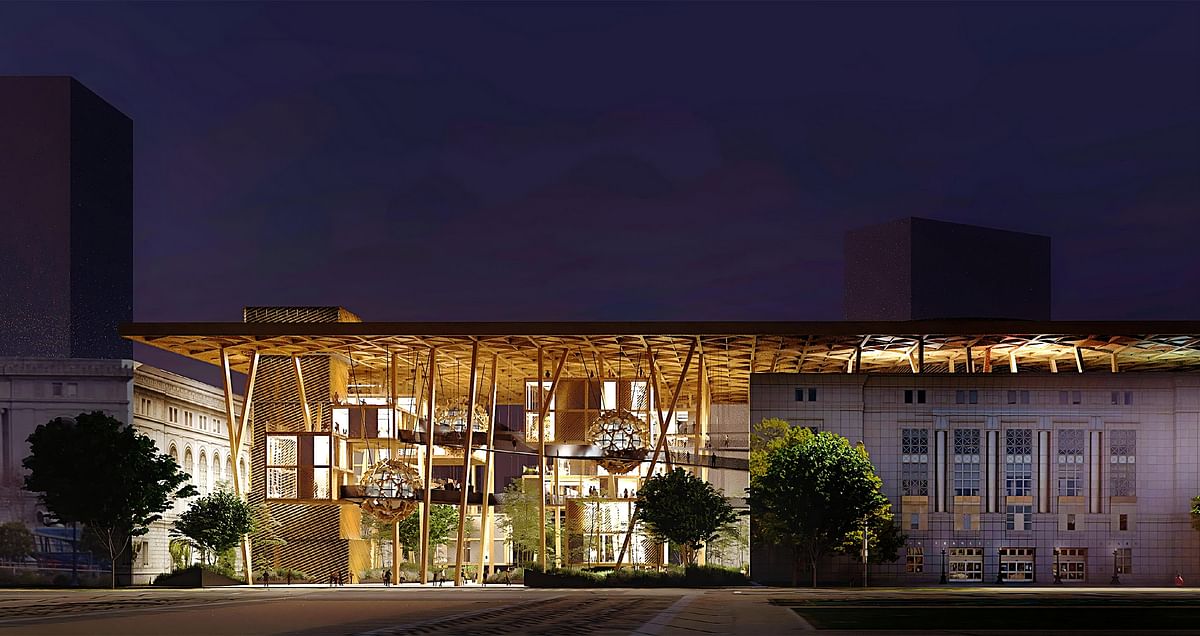
Related
The winners of Perkins&Will’s annual Phil Freelon internal design ideas challenge have been announced after a trio of projects focused on civic connection, adaptive and renewable thinking, emerging technologies, and information access were selected for the competition's 20th edition.
The brief for his year's contest asked participants to re-imagine civic space in the form of a library in the year 2049. The selected site for this latest challenge is the main public library of San Francisco, which was built in 1996 and sits adjacent to City Hall.
Each designer was asked: "Already, public libraries have had to adapt to the age of the internet and the changing habits of staff and visitors, transforming from passive collections of books to active zones for collaboration and creation. What other changes could we see in the next 25 years?"
A first, second, and third-place winner was selected, along with three honorable mentions.
First Place: Nest
Designed by Max Hu and August Miller
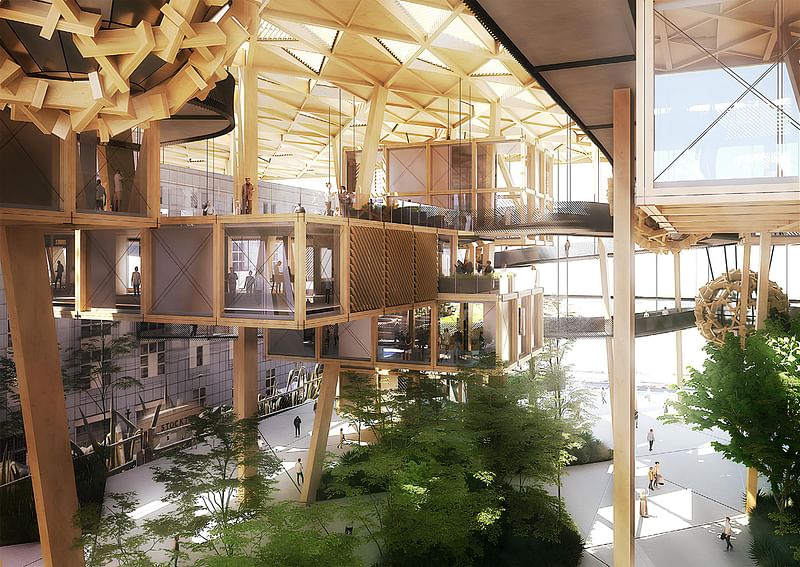
Description: "The winning concept imagines a new space in a near-future world where humans and artificial intelligence have established a mutualistic, long-term creative partnership. Dubbed Nest, the annex includes a collaborative terrace, virtual reality experience space, and studios for film, photography, art, and music. Architecturally, the new building is defined by a unifying timber roof and hanging canopy with catwalks linking together workspaces. Beyond being a natural extension of the existing library, Nest is an idea incubator, designed to host sophisticated tools like artificial intelligence that will be used by citizens to create solutions of the future."
"I felt like I could understand what it would be like to relate to this building as a citizen," juror Michael Peter Edson, chief museum officer and director of the Museum of Solutions in Mumbai, stated. "I think it reflects what Phil Freelon stood for and encouraged — to have a more human-scaled relationship with the built environment."
Second Place: Unbound Plazas
Designed by Alay Thakrar, Dhruv Vairagi, Harshika Seth, and Ravi Chandar

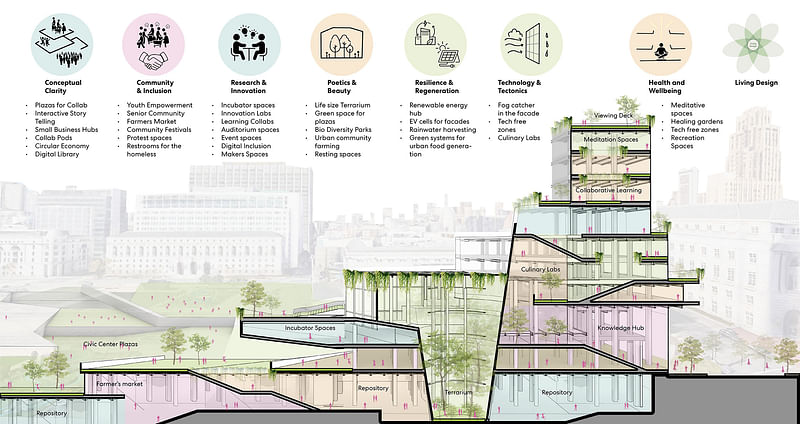
Description: "Where Nest seeks to address the spatial and functional limitations of the existing public library, Unbound Plazas proposes to extend the nearby Civic Center Plaza, becoming its own landscape for socialization and connection. Organic layers of the building spill into the plaza, featuring amenities such as a farmer’s market, media repository, and incubator spaces. The main tower and knowledge hub feature a distinct multi-floored terrarium for rainwater harvesting and urban farming."
"This is a living building that created an ecosystem. I like the idea of layering the landscape and finding public space with nature," said juror Rozana Montiel, founder of Rozana Montiel Estudio de Arquitectura in Mexico City. "Spaces in the library are reserved for activities like meditation, group cooking, and recreation. To address what the team sees as an emerging pattern of human disconnection and social isolation, they propose that the use of technology be banned from certain spaces altogether. Unbound Plazas suggests a new kind of civic space, one blended with a traditional park space, where human connections can be rebuilt."
Third Place: For The Makers of Memory
Designed by Adam Liu and Stephen Marinelli
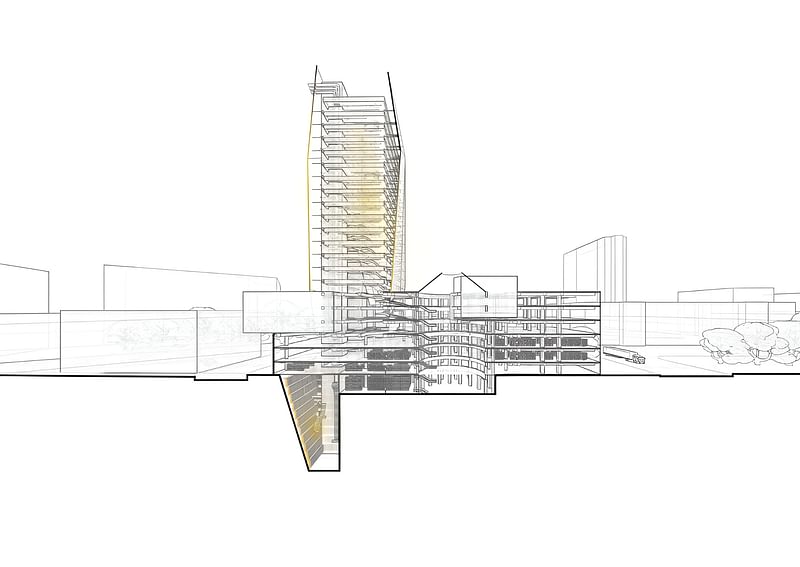
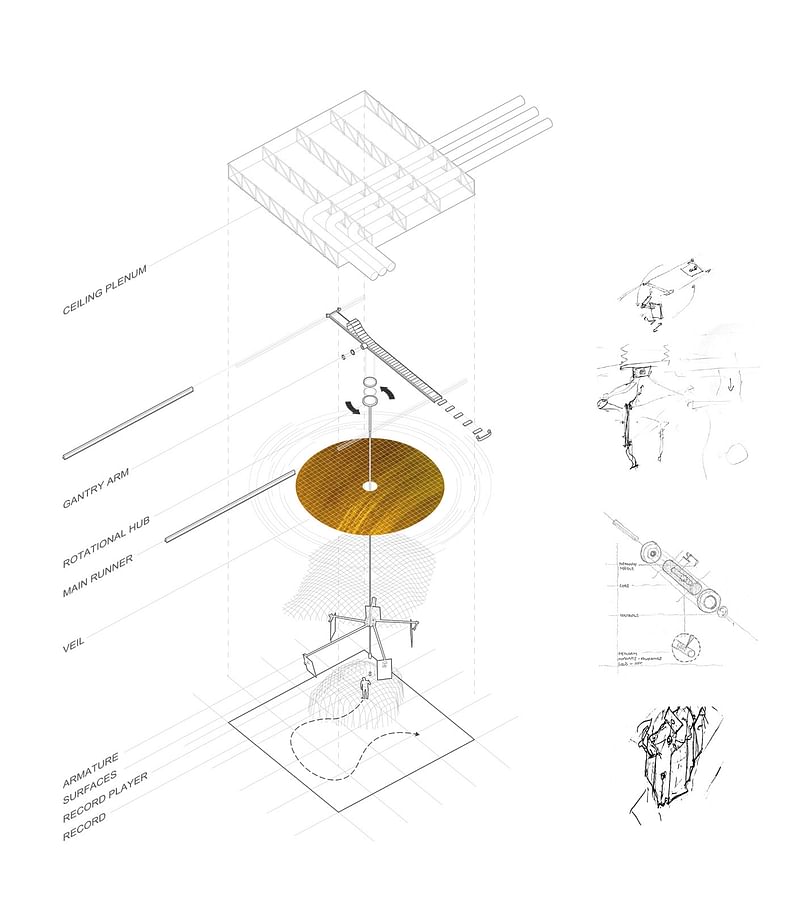
Description: "This team sought to address a future 'Library of Babel,' where the acceleration of artificial intelligence has created an overwhelming amount of information and digital content. In an increasingly hectic world, their proposal aims to slow down the ever-quickening pace of life through self-reflection and to elevate a human behavior that is universal. Inspired by the golden record aboard the 1977 Voyager craft, which serves as a time capsule of humanity at-large, the library features an extensive archival system below the Earth’s surface. San Francisco’s residents carry a 'record' with them, recording their experiences for upload to the library."
The three honorable mentions or citations are:
Libraries in Motion, designed by Liona Avery, Sarah Fleming, Yasmeen Barakat, and Nick Mason, taps into the city’s iconic network of cable cars, expanding the footprint of the library across the entire city with portable spaces.
Decentralized Horizons, designed by Neal Li, Abubakr Bajaman, and Chung Fai Lam, establishes a municipal grid system of permanent, adaptable, and on-demand libraries, each half a mile apart, that host their own unique amenities.
All! A Living Library, designed by Josh Fisher, Galen Carlson, Aayushi Mody, and Kishore Kandasamy, adapts the existing building in San Francisco’s plaza, transforming it into a new social destination that serves as a place for connection and creative inspiration.

RELATED NEWS Perkins&Will announces 2023 Phil Freelon Design Competition winners

RELATED NEWS NOMA highlights winners of the Phil Freelon Professional Design Awards, Student Design Competition and more at 2023 conference


Share
0 Comments
Comment as :